I hosted a funeral for me and 7 mates — this is why you should too
I’ve met hundreds of people who died before being resuscitated. Compared with business gurus or social media influencers, it is these patients who we should be listening to for lessons about life. They know what really matters
As a completely healthy 44-year-old, my last wishes had lingered on my to-do list for years – but after one particularly difficult intensive care night shift at Royal Perth Hospital, where another healthy 44-year-old had suddenly, unexpectedly met their maker, I decided to do something about it. I couldn’t sleep, and rather than remain trapped in my tumble-dryer mind I got out of bed and wrote an email to the family solicitors. I asked if they could turn my ramblings into my last will and testament.
After the boring financial section came the part that really woke me up – What do you want for your funeral? I knew I wanted a ceremony in the countryside, somewhere with mountains, a river, some birdsong. I wanted there to be live music and home-cooked food. French wine for the guests, and good coffee. I hate bad coffee. Stretching my imaginary requests even further, I wrote, “An outdoor log fire would be terrific.” In just ten minutes, I had fashioned my perfect day – albeit one that I would never get to enjoy.
My mind wandered to an occasion five years earlier, the funeral of my Aunty Win. She’d lived an extraordinary life, and died at 97. Her funeral was held under a sullen, pewter sky; it was as if nature itself was a mourner. With five others, I carried Win on my shoulder. Later, I read out her eulogy. After the service, as the final organ note ended, there was a palpable shift from solemnity to camaraderie. Mourners moved from the graveside to Win’s house. The warmth and solace came from each other’s company. The atmosphere lightened; a hum of conversation mingled with the clinking of teacups. Win’s favourite Welsh hymns looped in the background. Children played quietly in corners. Stories and laughter weaved through the air like an invisible thread, connecting everyone, and reaching out to Aunty Win. I remember thinking that Win would have loved it: she would have loved to be at her own funeral.
I’ve worked as an intensive care doctor for more than20 years, caring for patients who are in thick fog, tiptoeing between life and death. I’ve seen death up close. Statistically, one in five people admitted to the ICU die there.
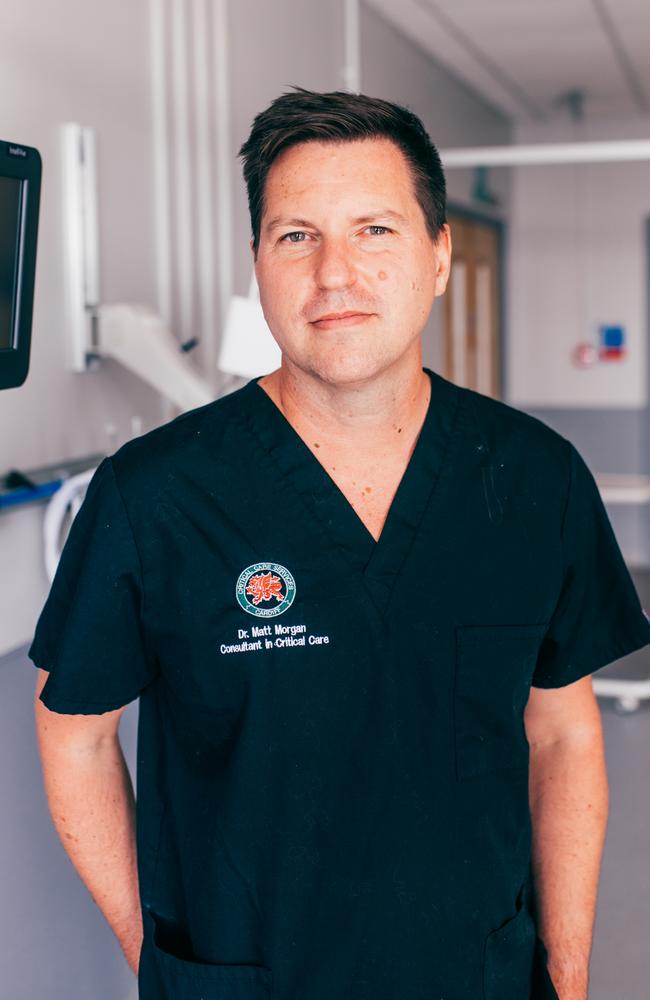
I’ve also met hundreds of people whose hearts stopped – they “died”, before being resuscitated – and lived to tell the tale. After Aunty Win’s funeral, I began to realise that compared with business gurus or social media influencers, it is these patients who are the people we really should be listening to. They know what really matters.
I started collecting the words spoken by these patients, their thoughts, and their answers to tricky questions. Some of them were striking. Alex, a 25-year-old Brit with a nut allergy, taught me that life is driven by chance. Cody, a 40-year-old miner from WA who’d suffered a cardiac arrest, taught me that meaning was to be found in moments and not in things. And 25-year-old Summer, who had attempted suicide, showed me how important it was to choose the right people to be surrounded by. In a small red book that I always kept on me, I scrawled down what I call their “whispers of life”. The book contains lessons from patients who were buried in snow, hit by lightning, overdosed on drugs, or teetered on the brink of death after contracting Covid.
The book came with me on a whirlwind trip home to Wales just a few months after I’d drafted my will in the dark of night. I stayed with my parents, gave a lecture, visited former colleagues, and walked up a mountain. I signed my will with the family solicitor. I also got drunk with my friends. It was those last two activities that were likely to be blamed for the idea I had next.
I met my friends Ben and James at a rural pub overlooking the sea just before sunset. Fumbling through my backpack to find their token gifts (a koala pen and Tim Tams), two items fell to the ground. Tangled up in my headphones was my little red book. It landed on the ground open to a page on which was scribbled, ‘Things that matter most ... Not things.’ It was what Cody, the miner, had told me when we met in the clinic after his brush with death. And next to my little red notebook was a copy of my will.
When my friends asked what they were, I half-jokingly said, “Oh nothing much, just the meaning of life and the best party that I will never be able to go to!”
Except, hang on a moment – what if I could go? Already, the various pieces of advice from patients that I’d scrawled in my little red book had helped me to think about the important things in life. Indeed, much of it had brought to mind the Douglas Adams adage that life is wasted on the living. These patients’ near-death experiences had been sudden, shocking and intense; the lessons they’d learned in the aftermath were profound. I’d wondered, how could I provide myself with a similar sense of urgency? In the pub, the answer suddenly came to me: I could host my own “living funeral”. After all, if life was wasted on the living, it stands to reason that funerals are wasted on the dead. I’m not sure whether it was the jetlag or the beer, but by the time the sun had set the three of us had agreed to organise my living funeral. “See you at my death!” I chirped.
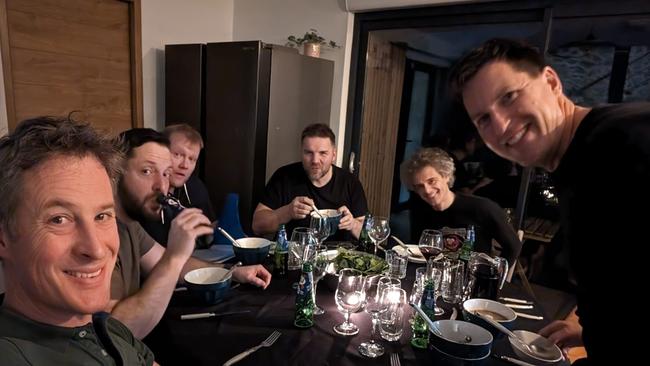
An unusual last-minute twist of fate then led me to the prestigious National Theatre, located on London’s South Bank. In my first year of medical school I’d lived with eight other students, a jumbled crew that included Tim, an English literature student from the Welsh valleys; 25 years later, Tim, now an accomplished playwright, had reached out to me unexpectedly. Both he and Michael Sheen – the star of his new production – required a medical adviser to help them with the details of a play they were working on at the National Theatre. It’s how I found myself face to face with the famous film star in a coffee shop, telling him about my plans to host my own funeral.
Michael told me how he would love to go back to Ancient Greek times, not only to see the birth of theatre but to quench his fascination with the Eleusinian Mysteries. I nodded along, pretending I knew what he was talking about. It turned out that the Greeks, and Michael Sheen, knew a lot more than me about living funerals. Carved deep in the limestone entrance arch of the Monastery of Agios Pavlos in Mount Athens is an inscription that translates as: “If you die before you die, you don’t die when you do.”
The Eleusinian Mysteries were a series of rituals and initiations, shrouded in enigma, in which participants grappled with the concept of death. Much of it centred around the tale of Demeter and Persephone, a mother and daughter whose story outlines the cyclical nature of life, death and rebirth. A marble carving at Eleusis in Athens vividly depicts these sacred mysteries. At its centre, Demeter, the goddess of agriculture, offers a stalk of wheat to Triptolemus – the gift of food. Persephone, Demeter’s daughter, stands beside them holding a fire torch, representing her journey between the underworld and the Earth. It shows people playing instruments, making art, supporting others, drinking wine, bathing naked.
After flying back to Australia, I thought a lot about what my friends and I had agreed to do. I wondered if it would belittle those who are terminally ill; I was worried it might upset my family, or be seen as an ego trip. But I realised that holding my funeral before I died would allow me a sneak preview of what mattered while I still had time to do something about it. How many funerals have you been to where you regret not having told the departed how much they meant to you? What if you could tell them? I forged ahead with one caveat: I would also use my experience, and the advice I had gained from my patients, to write a book – one that would pass on the valuable lessons from the patients I had cared for.
My initial plan was to hold a service in my local village church in Wales, close to the pub where we had conceived the idea. But then the vicar said they only provided funerals for “Christians who had died” – two very reasonable basic requirements that I couldn’t fulfill. It also felt narcissistic to centre the event just around me. So instead I took advice from writer Helen Keller, the first deaf and blind person to earn a college degree, who said, “I would rather walk with a friend in the dark than alone in the light.” I vowed to organise a group event with my friends so we could walk toward the dark together.
Not long afterward, I sent a message to my friends. It read: “Strange request alert! To help me write a book, I am planning a ‘living funeral’ for a group of friends. You would need to choose a song, a course for a meal or a drink, and a reading – which could be anything from a poem to a long joke. I have organised an independent celebrant to conduct the event where we’ll take it in turn to read out each other’s choices and a eulogy written by the people who love you.”
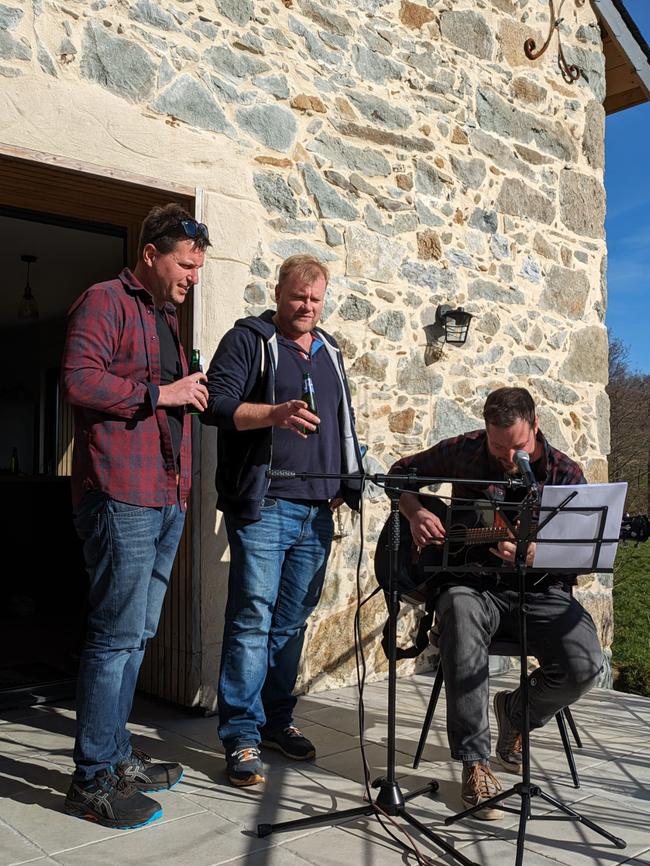
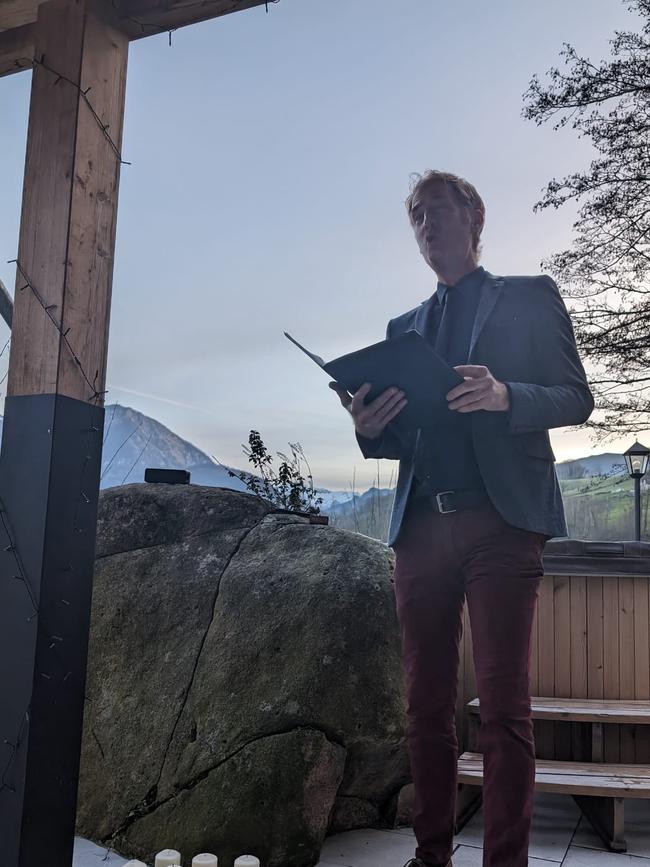
I found an idyllic cottage in the French Pyrenees to host the event. Notably, it even had a wood-fired hot tub with a strict “no clothes” policy that promised to help us loosen our inhibitions. Good home-cooked food was outsourced to a Sicilian mate, and my oldest school friend was the perfect choice for the live music, being a talented singer and guitarist. Other roles were constructed – someone to capture the event through a painting, and another to be the official photographer. We booked a local restaurant with not a single review, leaving its quality entirely to chance. We got the group’s party animal to source the wine.
I asked a French-based British celebrant named Mark to conduct the service. Having worked as a teacher before running a café, Mark had changed his own lifestyle radically a few years previously, moving to a remote part of France to set up his own business. He understood the power of reflection, was intrigued by the idea of a living funeral, and agreed to help.
Asking your partner, parents or siblings to write your eulogy is hard. It is fair to say the reactions were very mixed. While I overheard my wife and daughters laughing as they retold events from my life, for others this wasn’t so. Simply imagining someone you love not being there was too difficult for some; they couldn’t do it, no matter how fictional the funeral. For others, it caused conflict and disagreement. Despite being the most certain thing in life, it’s clear that death is still too much for many to contemplate.
When the day arrived, Mark gathered us outside the cottagewhere we put down our glasses, took a deep breath, and listened. “I have great pleasure to formally declare you all dead,” he announced. “It’s all over. You can’t see any of your loved ones again. You can’t achieve anything again. You can’t touch, feel, smell, emote again. Your time is up. Your legacy begins. What is your legacy? What and who have you left behind? How do you feel about your life? How do you feel about what you have done and said on this planet in the short time you have had here? Because today is your funeral. Today is the day your loved ones unite in grief to say goodbye to you. What does it mean to hear the words of your loved ones in your eulogies? What does it mean to experience dying today?”
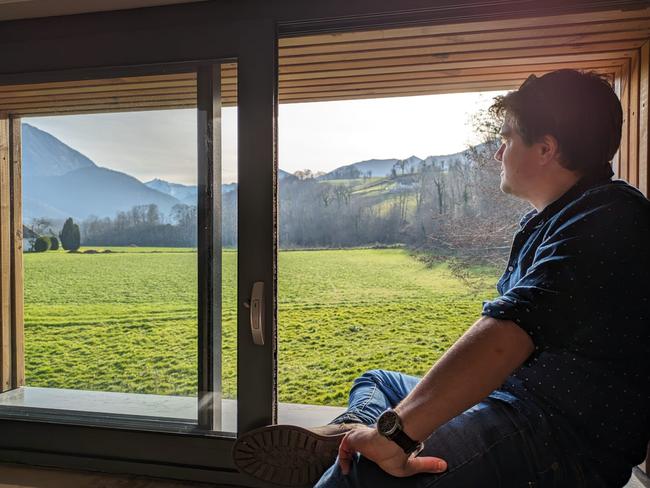
What followed was hard to describe. It was pure theatre, of course, but it still felt profoundly meaningful. Each of us in turn had a candle lit to symbolise our “death”, and we listened to the words put together by those who love us, read aloud by friends old and new. We each had a reading, then our chosen song was played beautifully by Carlo. Dave served the Italian food he had been taught to make by Corrado. James painted the scene despite not being a painter. Ben captured moments with his camera, while Jon opened the wine and Tom tended the fire. There was great laughter and deep joy. And there were tears. Eight grown men, silent, listening, crying. An antidote to toxic masculinity. Much that was said was tough to hear, tough to say.
My oldest friend Carlo, a logical maths-loving actuary geek and an amazing guitarist, struggled to play what should have been an easy song for him as I died. Jon, a GP who listened to tales of sadness daily in his clinic, had a tear in his eye as Corrado, whom he had only just met, passed away. And even if it were the dying person who cried, it was not their own demise that got to them; it was hearing the words written by their parents, their kids, their wives, their friends.
A lot of men struggle to open up to anyone, let alone other men. All men cry – but they do it alone, or when drunk. We were together, and almost sober. I didn’t cry because I was sad, or weak, but because I was grateful. Grateful that this living funeral had gifted me what felt like a second shot at life; grateful that I could try again and again to reconcile the passions and the rage that is a life. I didn’t expect how transformational this day would be. There we were together. At one point, eight men crying in a hot tub. We looked a lot like that marble carving of the Eleusinian Mysteries that Michael Sheen had told me about, although I’m not sure even the Greeks could fit eight men naked and crying into a hot tub. It was like the best birthday, with priceless gifts of words and time.
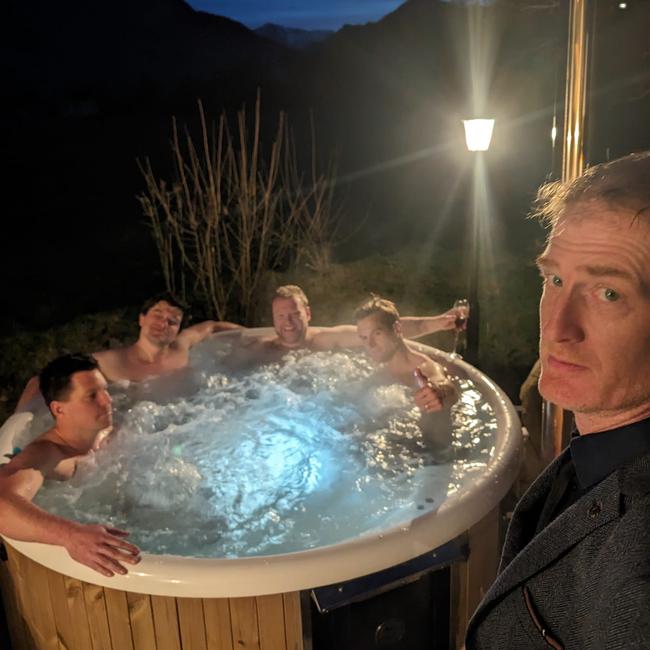
Our living funeral was the ultimate reality check. It nudged us not to wait for that special occasion to celebrate the people who matter. In the end, it was like attending the premiere of our own life’s movie, reminding us all to make each scene count and to appreciate unexpected plot changes. But it was also an opportunity to read our reviews while we could still make edits, and fix any plot holes.
At the end of the trip, as I packed away my toothbrush and made emergency repairs to the hot tub, which was not used to housing eight men, I wondered, would anything really change?
Six months later I found out. As compressed winter nights turned into long, summer-stretched evenings, I caught up with my friends during another trip home from Australia. While waiting at the airport, I received an email requesting a reference for Tom. He had started volunteering with underprivileged kids in London. Then I found out James had quit his job, swapping a long commute for a role closer to home for less money but more time. Our Italian amico Corrado had just returned from a cycling trip abroad, finally carving out time for himself alongside being a great husband and dad to a big family. Dave, a busy GP, had thrown himself into organising a community festival in Devon, filled with music, good food and raising money for a local charity. Jon ended years of planning a big trip to Japan by booking flights during his lunch break, resulting in a magnificent few weeks spent there with his family. Carlo had abandoned his long-sought early retirement plans, pulling money out of his theoretical actuarial spreadsheet and instead jointly buying land in Spain with his sister. And I chatted about all of these life changes with Ben as we played cricket for a local team, bowling our first balls for more than 25 years. We were terrible, and we didn’t care.
Yet the changes we felt after our living funeral weren’t always about making grand, sweeping decisions. Instead, we just had an ability to put things in perspective. When we had a shitty day, reflecting on that experience helped us all reset and approach situations with a clearer mind.
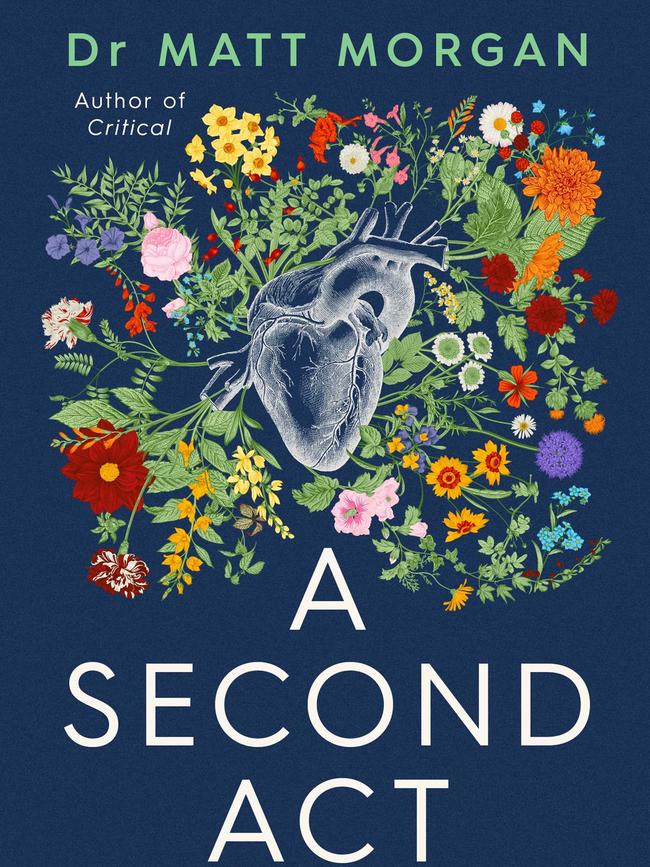
What about me? I’d moved my family across the world to Australia to find a better life and new meaning. But my living funeral had changed me too. The advantage of it pissing down in Wales for half of the year is that the grass really is greener. Absence doesn’t just make the heart grow fonder; it can remind us that the heart was there in the first place. It can be hard to see what is in front of us sometimes. It had taken this journey through the lives and deaths of others, and then the life and imagined death of me, to realise we missed our family, our friends, our colleagues, our home. And so we returned to Wales. I have vowed that I won’t let my life be wasted on living; don’t let your funeral be wasted on your death.
A Second Act: What Nearly Dying Teaches Us About Really Living (Simon & Schuster, $34.99) by Dr Matt Morgan is out on January 29

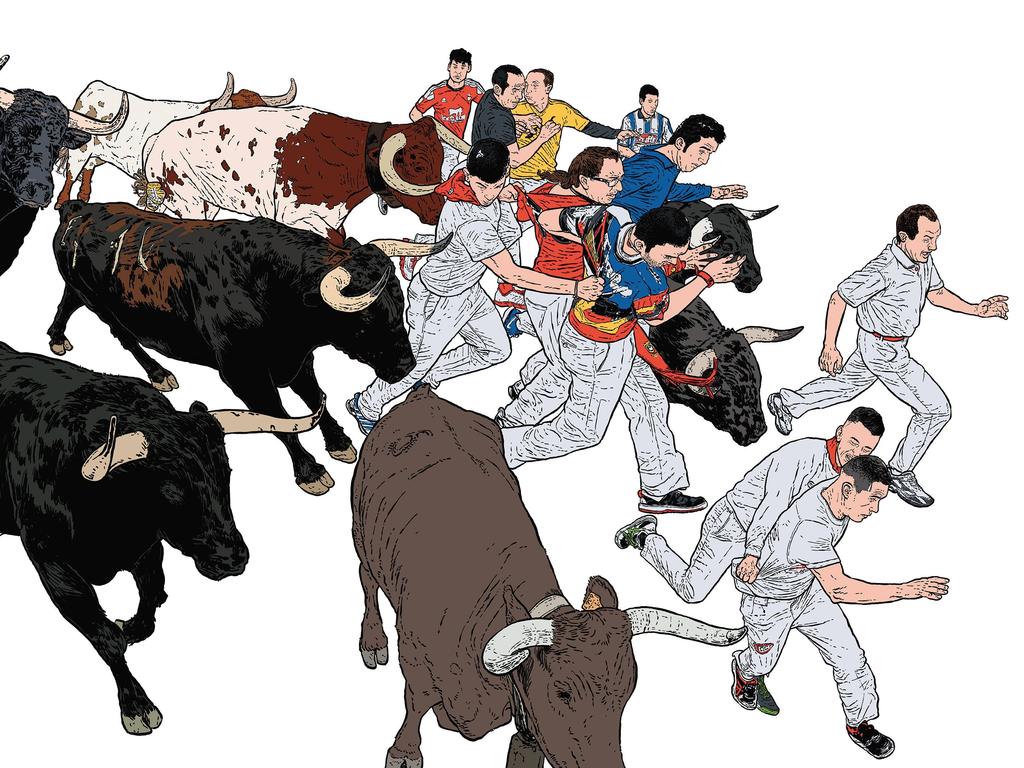
To join the conversation, please log in. Don't have an account? Register
Join the conversation, you are commenting as Logout